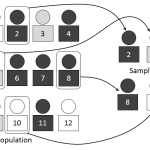Purposive Sampling > Expert Sampling
What is Expert Sampling?
 Expert sampling (or judgment sampling) is where you draw your sample from experts in the field you’re studying. It’s used when you need the opinions or assessment of people with a high degree of knowledge about the study area. When used in this way, expert sampling is a simple sub-type of purposive sampling.
Expert sampling (or judgment sampling) is where you draw your sample from experts in the field you’re studying. It’s used when you need the opinions or assessment of people with a high degree of knowledge about the study area. When used in this way, expert sampling is a simple sub-type of purposive sampling.
A second reason to use experts is to validate another sampling method (Singh, 2007). For example, let’s say you want to use snowball sampling to identify addicts in your area. You are concerned that using this non-random sampling method will adversely affect your results and the way your results are perceived by others. You can ask a panel of experts their opinion on whether snowball sampling is the most appropriate sampling method.
“Expert” doesn’t necessarily have to mean highly education and skilled in a field (although it often does). Sometimes it can refer to a more abstract construct of the “perfect” embodiment of a certain trait or set of characteristics. For example, Kitamaya & Cohen (2010, p.212) the term cultural expert does not have anything to do with education level, but rather it means “…the people most immersed in, most competent in, or who most embody a culture in its “pure” form.”
Disadvantage of Expert Sampling
One disadvantage of expert sampling is, like “experts” on Daytime television, anyone can purport to be an expert and their opinions might simply be wrong. For example, Dr. Oz is wrong 11% of the time, according to Bill Gifford writing for The New York Times. Interestingly, another “distinguished” expert mentioned in the article (Dr. Gilbert Ross) had been to prison for Medicaid fraud. The moral of the story is to choose your experts wisely.
Methodology
Expert sampling is generally a two-stage process:
- Decide what “expert” means. For example, you might define expert as someone with a Ph.D. and at least ten years experience in the study area.
- Select people who meet your “expert” criteria. This group of experts is sometimes called a panel.
References:
Gifford, B. (2015). Dr. Oz is no Wizard but No Quack Either. In the New York Times. Retrieved 1/23/2017 from: https://www.nytimes.com/2015/04/26/opinion/sunday/dr-oz-is-no-wizard-but-no-quack-either.html
Kitamaya, S. & Cohen, D. (2010). Handbook of Cultural Psychology. Guilford Press.
Singh, K. (2007). Quantitative Social Research Methods. SAGE publishing.